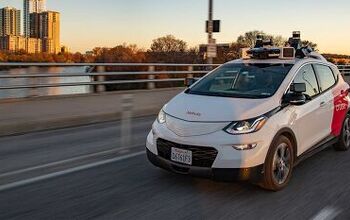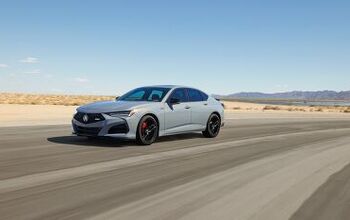EU Carmakers Want Return Of Cash For Clunkers

European carmakers are hurting. They hurt so much, they ask for government-prescribed painkillers. Renault’s COO Carlos Tavares wants a return of cash for clunkers. Credit rating agency Fitch warns there would be nasty after-effects.
“What I would like to see is support for the European and French auto markets,” Tavares told Reuters. Massive cash-for-clunkers programs were a shot in the arm of Europe’s carmakers in the critical years of 2008 and 2009. Tavares wants a re-run. Failing that, he would welcome “any other support measure that boosts demand.”
Europe’s carmakers are hurting to the tune of a nearly 9 percent drop of sales in the first five months of 2012. Some companies hurt more than others. Tavares’ Renault group is in the pangs of a 13 percent drop. Cross-town rival and GM alliance partner PSA suffers from a withdrawal of 19.5 percent of sales through May. Further south, Fiat is looking at a 12.6 percent drop.
Fiat’s Marchionne had lobbied for government support for a painless elimination of overcapacity. This plan has been shot down by an elsewhere occupied Brussels. EU bureaucrats could argue that there was no consensus: German carmakers Volkswagen, BMW and Daimler were openly against the communal slim-fest, and privately argued that survival of the fittest would be a better therapy.
While there most likely will be little hostility against a remake of the Abwrackprämie (as cash for clunkers was known in Germany) from Germany’s auto giants, opposition comes from a surprising camp: Fitch, the rating agency that normally assesses the likelihood of default. In a statement, Fitch says:
“Scrappage schemes give buyers a discount on a new car when they scrap an old one, having an immediate positive effect on sales. However, these schemes have little to no effect on creating new sales. Instead, they encourage buyers to bring forward purchases they would have made later, creating a sudden drop in sales, revenue and profitability when the incentives stop.
In addition, these fixed incentives distort the market by favouring sales of cheaper, lower-margin cars as customers typically seek to maximise the effect of the subsidy.”
The last statement is true. Renault’s Logan was amongst Germany’s best-selling cars during the Abwrackprämie. However, I did not hear anybody complain about sales of lower margin cars.
The first statement is patent nonsense. Nearly all Abwrackprämie sales were new sales, due to the simple fact that one had to retire a car 9 years or older. Owners of these cars usually never buy new, they buy used. Dealers complained (they always complain) that their showrooms were mobbed by customers they had never seen before and likely would never see again. Powered by the Abwrackprämie, German new car sales were up 23 percent in 2009, a year when U.S. car sales plummeted by 21 percent. Germans usually buy 3 million new cars per year. In 2009, it was 3.8 million cars, nearly all incremental sales. In 2010, with cash for clunkers over, German car sales were back to 2.9 million.

Bertel Schmitt comes back to journalism after taking a 35 year break in advertising and marketing. He ran and owned advertising agencies in Duesseldorf, Germany, and New York City. Volkswagen A.G. was Bertel's most important corporate account. Schmitt's advertising and marketing career touched many corners of the industry with a special focus on automotive products and services. Since 2004, he lives in Japan and China with his wife <a href="http://www.tomokoandbertel.com"> Tomoko </a>. Bertel Schmitt is a founding board member of the <a href="http://www.offshoresuperseries.com"> Offshore Super Series </a>, an American offshore powerboat racing organization. He is co-owner of the racing team Typhoon.
More by Bertel Schmitt
Latest Car Reviews
Read moreLatest Product Reviews
Read moreRecent Comments
- Kwik_Shift_Pro4X Thankfully I don't have to deal with GDI issues in my Frontier. These cleaners should do well for me if I win.
- Theflyersfan Serious answer time...Honda used to stand for excellence in auto engineering. Their first main claim to fame was the CVCC (we don't need a catalytic converter!) engine and it sent from there. Their suspensions, their VTEC engines, slick manual transmissions, even a stowing minivan seat, all theirs. But I think they've been coasting a bit lately. Yes, the Civic Type-R has a powerful small engine, but the Honda of old would have found a way to get more revs out of it and make it feel like an i-VTEC engine of old instead of any old turbo engine that can be found in a multitude of performance small cars. Their 1.5L turbo-4...well...have they ever figured out the oil dilution problems? Very un-Honda-like. Paint issues that still linger. Cheaper feeling interior trim. All things that fly in the face of what Honda once was. The only thing that they seem to have kept have been the sales staff that treat you with utter contempt for daring to walk into their inner sanctum and wanting a deal on something that isn't a bare-bones CR-V. So Honda, beat the rest of your Japanese and Korean rivals, and plug-in hybridize everything. If you want a relatively (in an engineering way) easy way to get ahead of the curve, raise the CAFE score, and have a major point to advertise, and be able to sell to those who can't plug in easily, sell them on something that will get, for example, 35% better mileage, plug in when you get a chance, and drives like a Honda. Bring back some of the engineering skills that Honda once stood for. And then start introducing a portfolio of EVs once people are more comfortable with the idea of plugging in. People seeing that they can easily use an EV for their daily errands with the gas engine never starting will eventually sell them on a future EV because that range anxiety will be lessened. The all EV leap is still a bridge too far, especially as recent sales numbers have shown. Baby steps. That's how you win people over.
- Theflyersfan If this saves (or delays) an expensive carbon brushing off of the valves down the road, I'll take a case. I understand that can be a very expensive bit of scheduled maintenance.
- Zipper69 A Mini should have 2 doors and 4 cylinders and tires the size of dinner plates.All else is puffery.
- Theflyersfan Just in time for the weekend!!! Usual suspects A: All EVs are evil golf carts, spewing nothing but virtue signaling about saving the earth, all the while hacking the limbs off of small kids in Africa, money losing pits of despair that no buyer would ever need and anyone that buys one is a raging moron with no brains and the automakers who make them want to go bankrupt.(Source: all of the comments on every EV article here posted over the years)Usual suspects B: All EVs are powered by unicorns and lollypops with no pollution, drive like dreams, all drivers don't mind stopping for hours on end, eating trays of fast food at every rest stop waiting for charges, save the world by using no gas and batteries are friendly to everyone, bugs included. Everyone should torch their ICE cars now and buy a Tesla or Bolt post haste.(Source: all of the comments on every EV article here posted over the years)Or those in the middle: Maybe one of these days, when the charging infrastructure is better, or there are more options that don't cost as much, one will be considered as part of a rational decision based on driving needs, purchasing costs environmental impact, total cost of ownership, and ease of charging.(Source: many on this site who don't jump on TTAC the split second an EV article appears and lives to trash everyone who is a fan of EVs.)

































Comments
Join the conversation
Would the European carmakers cutting their prices boost demand?
Union trash always want some free tax money. Stay away from union products.